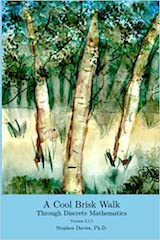
|
FreeComputerBooks.com
Links to Free Computer, Mathematics, Technical Books all over the World
|
|
- Title: A Cool Brisk Walk Through Discrete Mathematics
- Author(s) Stephen Davies
- Publisher: Blurb, Incorporated (May 30, 2020); eBook (Creative Commons Licensed)
- License(s): Creative Commons License (CC)
- Hardcover/Paperback: 256 pages
- eBook: HTML and PDF
- Language: English
- ISBN-10/ASIN: 171467584X
- ISBN-13: 978-1714675845
- Share This:

|
A Cool Brisk Walk Through Discrete Mathematics - and its companion site "allthemath.org" - are completely and forever free and open source educational materials dedicated to the mathematics that budding computer science practitioners actually need to know. They feature the fun and addictive teaching of award-winning lecturer Dr. Stephen Davies of the University of Mary Washington in Fredericksburg, Virginia!
About the Authors- Stephen Davies is a professor of Computer Science at the University of Mary Washington, a super groovy public liberal arts college in Fredericksburg, Virginia.
- Discrete and Finite Mathematics
- Graph Theory
- Combinatorics and Game Theory
- Algebra, Abstract Algebra, and Linear Algebra
- Mathematical Logic (Set Theory, etc.)
- Probability and Stochastic Processes

- A Cool Brisk Walk Through Discrete Mathematics (Stephen Davies)
- The Mirror Site (1) - PDF
- The Mirror Site (2) - HTML and PDF
- The Mirror Site (3) - PDF (688 pages)
-
 Notes on Discrete Mathematics (James Aspnes)
Notes on Discrete Mathematics (James Aspnes)
Present a precise relevant comprehensive approach to mathematical concepts, this text was written to accommodate the needs across a variety of majors and departments including mathematics computer science and engineering.
-
 Discrete Mathematics: An Open Introduction (Oscar Levin)
Discrete Mathematics: An Open Introduction (Oscar Levin)
This is a gentle introduction to discrete mathematics. Four main topics are covered: counting, sequences, logic, and graph theory. Along the way proofs are introduced, including proofs by contradiction, proofs by induction, and combinatorial proofs.
-
 Mathematics for Computer Science (Eric Lehman, et al)
Mathematics for Computer Science (Eric Lehman, et al)
This book covers elementary discrete mathematics for computer science and engineering. It emphasizes mathematical definitions and proofs as well as applicable methods. explores the topics of basic combinatorics, number and graph theory, logic and proof techniques.
-
 Isomorphism - Mathematics of Programming (Xinyu Liu)
Isomorphism - Mathematics of Programming (Xinyu Liu)
This book introduces the mathematics behind computer programming. It intents to tell: programming is isomorphic to mathematics. Just like in art and music, there are interesting stories and mathematicians behind the great minds.
-
 Discrete Mathematics for Computer Science Students
Discrete Mathematics for Computer Science Students
This book gives thorough coverage to topics that have great importance to computer scientists and provides a motivating computer science example for each math topic. Contents: Counting; Cryptography and Number Theory; Reflections on Logic and Proof.
-
 Applied Discrete Structures, Fundamentals (Al Doerr, et al)
Applied Discrete Structures, Fundamentals (Al Doerr, et al)
This book contains most of the fundamental concepts taught in a one semester course in discrete mathematics which is a required course for students in Computer Science, Mathematics and Information Technology.
-
 Advances in Discrete Differential Geometry (Alexander I. Bobenko)
Advances in Discrete Differential Geometry (Alexander I. Bobenko)
It surveys the fascinating connections between discrete models in differential geometry and complex analysis, integrable systems and applications in computer graphics and is illustrated to convince readers it's both beautiful and useful.
-
 Mathematical Foundations and Aspects of Discrete Mathematics
Mathematical Foundations and Aspects of Discrete Mathematics
This is a book about discrete mathematics which also discusses mathematical reasoning and logic. It offers an introduction to discrete mathematics for undergraduate students in computer science and mathematics.
-
 A Spiral Workbook for Discrete Mathematics (Harris Kwong)
A Spiral Workbook for Discrete Mathematics (Harris Kwong)
This is a book on discrete mathematics with an emphasis on motivation. It explains and clarifies the unwritten conventions in mathematics, and guides the students through a detailed discussion on how a proof is revised from its draft to a final polished form.
-
 Discrete Structures for Computer Science: Counting, Recursion
Discrete Structures for Computer Science: Counting, Recursion
This book provides a broad introduction to some of the most fascinating and beautiful areas of discrete mathematical structures with examples in logic, applications of the principle of inclusion and exclusion and finally the pigeonhole principal.
-
 Mathematics for Computer Scientists (Gareth J. Janacek, et al)
Mathematics for Computer Scientists (Gareth J. Janacek, et al)
The aim of this book is to present some the basic mathematics that is needed by computer scientists. The reader is not expected to be a mathematician and we hope will find what follows useful.
-
 Lists, Decisions and Graphs - With an Introduction to Probability
Lists, Decisions and Graphs - With an Introduction to Probability
In this book, four basic areas of discrete mathematics are presented: Counting and Listing (Unit CL), Functions (Unit Fn), Decision Trees and Recursion (Unit DT), and Basic Concepts in Graph Theory (Unit GT).





